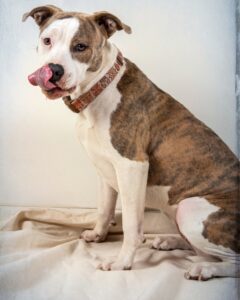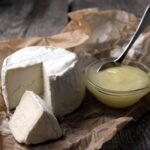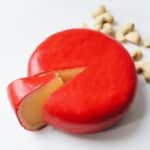As a constant feature of our pantries, butter is nearly as commonplace in American homes as our beloved dogs. From baking to frying and spreading on toast, butter is essential in our culinary creations. However, just because it’s integral to our diets doesn’t mean it’s safe for our pets. This article seeks to educate dog owners about the risks and implications of dogs consuming butter.

The Dangers of Butter for Dogs
As a dog owner, you may wonder, “Is butter dangerous for my pet?” While the high fat and calorie content in butter can lead to severe health issues like pancreatitis, obesity, and reduced brain insulin transport, it is important to clarify that these concerns typically arise from consistent overconsumption or when a large amount is eaten at once.1
A small lick or taste of butter occasionally is unlikely to cause harm to a healthy dog. However, regularly feeding your dog butter, even in small amounts, can add substantial calories to their diet and contribute to weight gain over time. It could also lead to a preference for fatty foods, which can create unhealthy eating habits.
Moreover, while a small, infrequent dose may not be immediately harmful, a large intake of butter — such as if your dog gets into a tub of butter when you’re not looking — can lead to immediate digestive upset and potential pancreatitis. Hence, while butter is not inherently toxic to dogs, it is not a safe or healthy food for them, and consumption should be carefully monitored and ideally avoided.
Variables Influencing the Danger of Butter
Several variables determine how harmful butter may be for your dog. Here are a few to keep in mind:
- Amount Consumed: A lick of butter off your finger may not cause problems, but a whole stick could lead to digestive upset or worse.
- Type of Butter: There are many butter substitutes and spreads available, some of which contain ingredients like xylitol, a sweetener highly toxic to dogs.
- Size of Dog: A larger dog may handle a small amount of butter better than a smaller dog.
- Concentration: Foods with high butter concentrations, like butter cookies or cake, pose a more significant risk.
Recognizing Butter Toxicity in Dogs: Symptoms
- Vomiting: This is often the first symptom that your dog’s body is trying to expel something harmful. It may occur within a few hours of consuming a large quantity of butter, especially if the dog is unaccustomed to such fatty foods.
- Diarrhea: This can occur alongside vomiting or independently as your dog’s system tries to rapidly clear the butter. Diarrhea may cause dehydration if it continues over time, warranting professional veterinary attention.
- Abdominal Pain: A dog in discomfort might exhibit signs like whining, restlessness, or a hunched back. They might also react negatively to their belly being touched, which can indicate abdominal pain, a sign of pancreatitis.
- Lethargy: Your dog may seem unusually tired or uninterested in activities they usually enjoy. This can result from discomfort or general malaise associated with dietary indiscretion or more severe conditions like pancreatitis.
- Loss of Appetite: A dog feeling unwell may lose interest in food or have difficulty eating. This symptom, combined with other signs like vomiting, lethargy, or abdominal pain, could suggest pancreatitis and should prompt an immediate veterinary consultation.
- Fever: In severe cases, a dog that has ingested a large amount of butter might develop a fever, another symptom of pancreatitis or systemic inflammation. The dog might feel unusually hot, be panting excessively, or exhibit shivering. A rectal temperature above 102.5°F usually indicates fever in dogs.
If your dog shows one or more of these symptoms after consuming butter, it is crucial to seek veterinary help to ensure they get appropriate care and treatment.
What to Do If Your Dog Has Consumed Butter
If you discover your dog has consumed butter the course of action largely depends on the amount ingested and the symptoms they exhibit. Here are some steps to consider:
- Do Nothing: If your dog has just licked a small amount of butter, say off your fingers or the edge of a butter dish, there may not be any need for immediate action. Monitor them closely for any changes in behavior, but chances are they will not be adversely affected by this small amount.
- Home Remedies: If your dog has consumed a larger amount of butter, perhaps by stealing a pat of butter from a plate, but doesn’t show any signs of illness, you can consider some home remedies. Start by offering your dog a bland diet, such as boiled chicken and rice, to soothe their digestive system. Ensure they have plenty of fresh water available to prevent dehydration, particularly if they exhibit signs of diarrhea or vomiting.
- Over-the-counter Treatments: If your dog shows signs of mild discomfort, such as intermittent vomiting or soft stool, you can also consider over-the-counter treatments. Canine probiotics or digestive aids can help restore balance in your dog’s gut. However, these should only be administered under the guidance of a vet.
- Call the Vet: If your dog has consumed a significant amount of butter or exhibits severe symptoms like continuous vomiting, persistent diarrhea, lethargy, or signs of abdominal pain, it’s time to call the vet. Your dog might be at risk of pancreatitis, which is a severe and potentially life-threatening condition that requires immediate medical attention.
Remember, when it comes to your pet’s health, it’s always better to err on the side of caution. If you are unsure about the best course of action, do not hesitate to reach out to a veterinary professional for advice.
A Final Word on Dogs and Butter Consumption
In conclusion, as dog owners, our primary concern is always the health and well-being of our pets. While butter might be an everyday staple in our diets, it’s crucial to understand its potential harm to our four-legged friends. By recognizing the dangers, symptoms, and appropriate actions, we can ensure our dogs remain safe and healthy, while still enjoying the occasional, carefully measured treat.
Citations
Obesity induced by a high-fat diet is associated with reduced brain insulin transport in dogs., (2000).
Frequently Asked Questions About Dogs Eating Butter
-
While a small amount of butter occasionally may not harm your dog, foods high in butter are not recommended. These can lead to excessive caloric intake, weight gain, and, as previously discussed, serious health conditions like pancreatitis.
-
Coconut oil, while often touted for its health benefits, can cause stomach upset and weight gain when given in excess due to its high fat content. Avocado oil (or avocados in general) should also be avoided, as they contain persin, a toxin harmful to dogs. Margarine and other spreads, especially those containing the artificial sweetener xylitol, are particularly dangerous as xylitol can be extremely toxic to dogs, leading to low blood sugar, seizures, and even liver failure.
-
Healthy fats are crucial for dogs, supporting skin and coat health, brain development, and overall well-being. Instead of unhealthy sources like butter or certain oils, consider incorporating omega-3 and omega-6 fatty acids into your dog’s diet. These can be found in fish like salmon, sardines, or in fish oil supplements. Flaxseeds or flaxseed oil can also provide these beneficial fats. Always consult with a vet before introducing new elements to your pet’s diet to ensure they’re balanced and beneficial.







